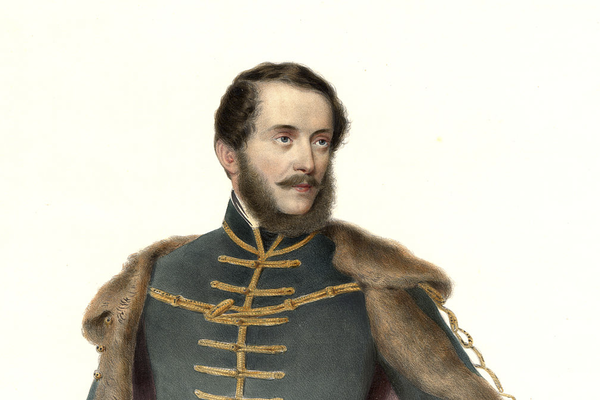Hungarian-American Relations in 1849 and Today: Why We Need Another Lajos Kossuth

Lately, commentators have warned that conservative regimes in the United States and Hungary are using the upheavals of the coronavirus pandemic as additional leverage to increase their authoritarian hold on government. The two countries may seem an odd political couple. But a largely forgotten historical drama, involving a Hungarian who asked America to help him establish democracy on the eve of our Civil War, reminds us it is not so. The American visit of Lajos Kossuth and its consequences offer a stark contrast with the new, darkening chapter in Hungarian-American relations.
Kossuth was a Hungarian lawyer who emerged as a leader of the Hungarian rebellion in 1849 against the crusty Habsburg Empire. Kossuth and supporters presumed to declare Hungary an independent republic. War erupted, pitting the polyglot ethnic groups of Central and Eastern Europe against one another. The Hungarians held their own until Russia, ever eager to squelch thoughts of democracy, came to the Austrians’ aid. Kossuth escaped, gaining asylum in Ottoman Turkey before boarding a steamship, the U.S.S. Mississippi, which brought him to New York City. There he received the equivalent of a tickertape parade before launching a six-month speaking tour of the United States. Kossuth however failed to secure his grand prize, U.S. intervention in Europe. He left frustrated, and spent the rest of his life in exile.
But in his day the American people embraced him, offering banquets, parades, money, and, from several state arsenals, arms. The poet Ralph Waldo Emerson hailed him at Concord Bridge. Several towns and counties across the country renamed themselves for the Magyar, and Secretary of State Daniel Webster so vociferously endorsed Kossuth that Austria effectively severed relations with the United States for nearly a year. Abraham Lincoln paid tribute by co-authoring a citizens’ resolution declaring that all people had the right of revolution and self-determination.
Kossuth, hailed as Webster’s equal in public speaking – he claimed he had learned English reading the Bible and Shakespeare- brought audiences to tears in his stirring words about democracy’s prospects on both sides of the Atlantic in that pregnant age. “Liberty is a principle; its community is its security; exclusiveness is its doom.” “The cause of freedom is identified with the destinies of humanity, and in whatever part of the world it gains ground by and by,
it will be a common gain to all those who desire it.” And, “the spirit of our age is Democracy. All for the people and all by the people. Nothing about the people without the people.” Yes, that last one sounds familiar, because Lincoln as president rephrased it as “that government of the people, by the people, for the people, shall not perish from the earth” at Gettysburg in 1863.
Lincoln and the new Republican Party took Kossuth’s warning seriously that unchecked authoritarianism in his country could echo in the American West, where, by the 1850s, the presence or absence of slavery would determine the fate of the republic. The Kansas territory saw warfare rage between antislavery “jayhawkers” and proslavery “border ruffians” over its status; incidents of U.S. military troops firing on antislavery Kansans dramatized how the federal government under presidents Franklin Pierce and James Buchanan appeared complicit. Congressman Galusha Grow, for one, warned, “With the shout of law and order you arrest and put in chains order-loving citizens…for peaceably petitioning the Government for a redress of grievances….Law and order is the excuse of despotism, the world over…. It was to preserve law and order that…the dungeon and the rack silenced the voice of patriotism in Hungary.” Poland, Grow added, had seen “its streets red with the best blood of its citizens,” not before, but after a Russian general had suppressed a popular uprising, and delivered to the Czar the notorious report, “Order reigns in Warsaw.” Now a proslavery governor of Kansas designed to “send a like dispatch to his superior, ‘Order reigns in Kansas’.” Kossuth’s impact helped to expose the American heartland’s creeping resemblance to recent European battlegrounds.
The Civil War, when it came, represented antislavery Americans’ impulse not to allow the crushing of democracy in Europe to become a prediction of its fate in the United States. On Independence Day 1861, Lincoln declared that on “the fate of these United States” hung the balance of “the whole family of man.” Critics of subsequent American foreign policy have called Lincoln’s 1862 assertion that the divided country was the world’s “last best hope” arrogant. But the Union’s extinction of the Slave Power’s counterrevolution was the ultimate American answer to Lajos Kossuth’s appeal a decade earlier. And it saved the country.
Today the United States and Hungary may seem even more different than they were when the foreigner Kossuth alerted Americans to the illusions of their exceptionalism. Yet in both places, the press is being attacked, voters disenfranchised, and immigrants scapegoated. That American versions of these conditions are less obvious, or merely analogous, doesn’t mean “it can’t happen here.”
Who will be our Kossuth?